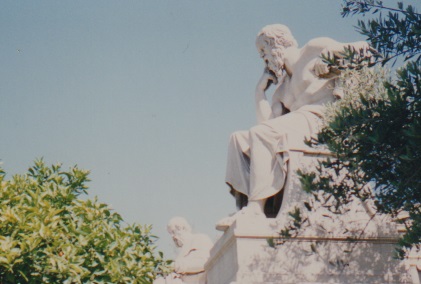Sec.1.3 Target of science is the world of reality
- But it is in the Logos. -
Heraclitus live as if each individual had his own insights, but there is something common about Logos. Therefore, just as the state strengthens by law, individuals must strengthen themselves by the low common to all things." So, he wrote a book called "About Nature" and dedicated it to the temple. The description is an approach of how to understand reality and how to copy it correctly. On the other hand, in the Chinese thought world, Confucius (B.C. 561-479) was discussed as a central issue. There is no God in the word, and the way of behavior is left as a sentence of words. However, what ancient Greek philosophers were looking for was "logos" that is everyone could share, and for that reason, "logic to testify" was the subject of discussion. In Japanese, the expression of a conclusion changes depending on the feelings of the talker. In English, the expression of conclusions is simple and clear. The English is now used like a common language on the Internet.
Sec.1.4 Plato's academy
- Ignorant of mathematics does not enter -
Plato's eternal truth is not in the real world, but in the world of idea.
In other words, this desk and that desk are common to all of the real desks,
and this was named idea because there is a thing that truly exists only
for the desk that each desk is common. In other words, truth was not an
object of the senses, but an object of reason [4].  However, Plato's pupil Aristotle said that idea is a concept created from experience. Aristotle believed that orientation and idea were brought about by seeing and listening. The idea they discussed exists in the neural network in the cerebrum. The computer calculates it, but the essential function of the brain is to call and use what is remembered. In modern times, technologies have been developed that enable computers to learn large amounts of data, automatically extract features from that data, and enable image recognition and speech recognition.
However, Plato's pupil Aristotle said that idea is a concept created from experience. Aristotle believed that orientation and idea were brought about by seeing and listening. The idea they discussed exists in the neural network in the cerebrum. The computer calculates it, but the essential function of the brain is to call and use what is remembered. In modern times, technologies have been developed that enable computers to learn large amounts of data, automatically extract features from that data, and enable image recognition and speech recognition.
Sec.1.5 The key to the science on everyday reality
- 1 plus 1 is not 2. -
Today, research on extrapolating the extracted law that represents an established quantitative causal relationship has been active.
At the academic conference, the results processed by computer calculations were taken up as an indisputable science.
However, as it becomes clear from the computerized driving of a car, the information used for calculation must continue to be collected instantaneously from reality.
Around 2000, Japanese ministry of education tried to promote science and
technology, in order to prevent students leaving from science and the decline
of science ability, universities began to conduct self-evaluations. As
a result, serious students who liked theory who were considered to have
high academic ability who were deprived of individuality by uniform education
were increased. Since it was necessary to cite many papers at academic
conferences, only papers that cited esoteric theories were accepted. So,
groundbreaking research reports transmitted from Japan have disappeared,
falling from the forefront of science in the world, and accelerating the
path of self-destruction. To promote science, it was necessary to work
freely and respectfully with individuality.
Since the science rule all things equally, we must be aware of the danger
that by controlling human beings with science, it will be rampant to disregard
human rights and endorse inhumane acts. However, being free from bondage
risks causing chaos, so it is necessary to establish a sensible individual.
From now on, we can expect progress not only in the field of information such as artificial intelligence, but also in science that focuses on everyday reality. The real world of everyday life can be recognized by the fact that "one plus one is not two" or “sudden changes of mind" .
[Reference] [4] Bryan Magee, "The story of philosophy", A Dorling Kindersley Book,1998
to index page -1.2-